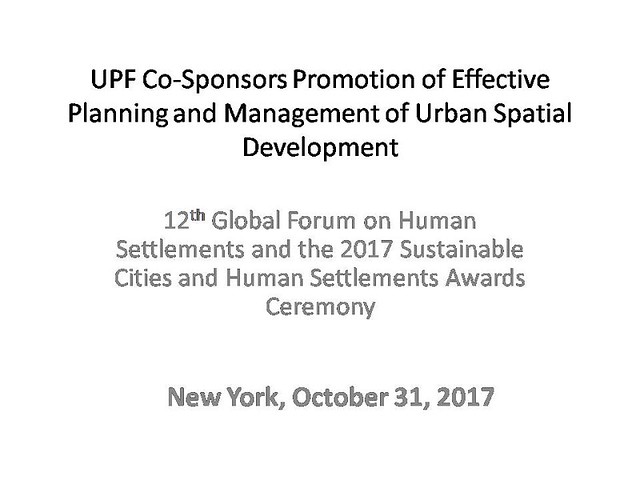New York, United States—UPF was one of the sponsors of the 12th Global Forum on Human Settlements and the 2017 Sustainable Cities and Human Settlements Awards Ceremony.
The forum (GFHS) and the SCAHSA ceremony were held on October 30 and 31, 2017, in observance of World Cities Day, at the Millennium Hilton New York One UN Plaza hotel.
Other co-sponsors were the GFHS, together with the Permanent Observer Mission of the African Union to the UN, the Permanent Mission of Gambia to the UN, the United Nations Environment Programme, the World Association of Non-Governmental Organizations (WANGO), and the Better City Institute.
Under the theme of "Effective Planning and Managing Urban Spatial Development to Implement the 2030 Agenda for Sustainable Development and the New Urban Agenda,” GFHS-XII attracted around 400 representatives, including government officials, experts, and entrepreneurs from over 30 different countries. The two-day forum included a closed-door meeting and high-level dialogues on the International Green Model City Initiative and the implementation of the 2030 Agenda for Sustainable Development and New Urban Agenda at the local level.
The forum achieved fruitful results, among which were in-depth discussions to promote innovative actions, honoring a number of best practices, and launching the Online Rating System of the International Green Model City Initiative.
Prominent attendees included Ambassador Anwarul K. Chowdhury, the chair of GFHS and a former UN under-secretary-general and high representative; H.E. Mr. Mamadou Tangara, ambassador and permanent representative of Gambia to the United Nations; Ms. Martina Otto, head of the Cities Unit, Economy Division, United Nations Environment Programme; Mr. Arab Hoballah, senior sustainability expert and the former chief, Sustainable Lifestyles, Cities and Industry Branch, United Nations Environment Programme; Ms. Yamina Djacta, representative of the Consortium for Sustainable Urbanization and the former director of UN-Habitat New York Office; Dr. Tageldin Hamad, the vice chair of GFHS, chair of the World Association of Non-Governmental Organizations, and vice president of UPF International; Mr. Lu Haifeng, secretary general of GFHS and president of the Better City Institute; Mr. Serge Salat, president, Urban Morphology and Complex Systems Institute, Paris, France.
In his opening remarks, Ambassador Chowdhury said: “Sustainable urban development is one of the most pressing challenges facing the human community in the 21st century. As more and more people make cities their home, cities will be the arenas in which some of the world’s biggest social, economic, environmental and political challenges will be faced and need to be addressed collectively. It is therefore significant that GFHS has, since its establishment, been focusing on these challenges at each of its annual conferences. This twelfth forum in the series is again another timely, relevant and appropriate initiative that is aimed at making the international community alert and proactive to the issues of urbanization in a holistic manner.”
Ms. Otto said,“The way we plan land use, how we plan, design and manage cities, will determine whether the amazing transformational power of urbanization contributes to or stifles the objective of sustainable development for all, that we leave no one behind, and achieve sustainable and inclusive economies and environmental sustainability.”
GFHS-XII is an innovative, action-oriented conference. The Observance Ceremony for World Cities Day 2017 was held during the opening ceremony. Six city mayors from different regions of the world and six distinguished individuals from business and academia (including non-governmental organizations) have made their own commitments to sustainable urban development.
The conference discussed in depth the International Green Model City Initiative and explored the International Green Model City Standards 3.0 as an advanced planning tool for assessing and guiding sustainable urban development and promoting sustainable cities and human settlements for all.
The city of Vancouver, the city of Cape Town, the city of Seberang Parai, the city of Cuenca, the city of Mannheim, Liuyang Economic and Technological Development Zone, and Changsha Vanke Real Estate Co. Ltd., Country Garden Pacific View Ltd, Mission Hills Group were presented with plaques recognizing them as International Green Model City foundation partners. The recognition was meant to encourage them to be pioneers in integrating the International Green Model City Standards 3.0 in their own cities and project development, and to more effectively plan and manage urban spatial development and implement the 2030 Agenda for Sustainable Development and New Urban Agenda.
The Launch Ceremony of the Online Rating System of the International Green Model City Initiative was held at the opening session. Mr. Lu Haifengof GFHS, Ms. Martina Otto of the United Nations Environment Programme, and other guests unveiled the system, which is a well-developed global online assessment and certification platform for sustainable cities and communities. Based on the International Green Model City Standards 3.0, the rating system uses the Internet and big data technology to make assessments and diagnosis much easier. Participants at the launch ceremony had a real-time experience of testing the system on their mobile phones.
Sustainable Cities and Human Settlements Awards were given to 23 winners who have integrated the 2030 Agenda for Sustainable Development and the New Urban Agenda.(Please refer to the GFHS official website atwww.gfhsforum.org for a list of winners.)
The next GFHS annual forum is scheduled to be held in Bangkok, Thailand, in October 2018.
GFHS is a 501(c) (3) not-for-profit organization with Special Consultative Status with ECOSOC. It is committed to sustainable cities and human settlements for all, and to building a world platform for dialogue on sustainable cities and human settlements. GFHS has cooperated in various areas with the United Nations Department of Economic and Social Affairs, the United Nations Environment Programme, and the United Nations Human Settlements Programme.
The annual Global Forum on Human Settlements has been held in China, the United States, Brazil, Germany, Colombia and Ecuador for 12 consecutive years. Around 13,000 representatives from all sectors of society have attended the forum, which provides a highlevel of dialogue platform for governments, non-governmental organizations, corporations, and scholars, and contributes a lot to the implementation of the United Nations Millennium Development Goals, the Habitat Agenda, the 2030 Agenda for Sustainable Development and the New Urban Agenda.

